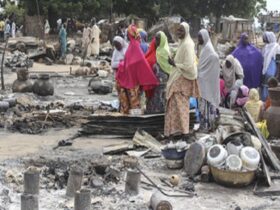A World Health Organisation official reported Friday that the ongoing civil war in Sudan is worsening the humanitarian crisis, leading to a surge in infections like cholera, which has claimed over 300 lives.
Cholera, caused by bacteria in contaminated food and water, requires access to clean water and sanitation to prevent its spread.
Without treatment, it can be fatal within hours, though it may also present with mild or no symptoms. Children under five are especially vulnerable.
Heavy rains and flooding have intensified healthcare disruptions, worsening the spread of malaria and dengue fever.
The conflict has led to the closure of most hospitals and health facilities, leaving two-thirds of Sudan’s war-torn population without essential medical services.
WHO’s Margaret Harris stated that there have been 11,327 reported cholera cases resulting in 316 deaths, with cases of dengue fever and meningitis also increasing.
Reports indicate that medical staff in Sudan, including doctors and nurses, have been killed or injured, severely impacting healthcare access.
Attacks on medical facilities and personnel are compounding the crisis, as people struggle to receive treatment for even minor issues.
The International Committee of the Red Cross (ICRC) has highlighted the dire consequences of these assaults amid a worsening food crisis.
Since April 2023, the conflict has led to the world’s largest displacement crisis, with over 10 million people fleeing their homes.
Rising food and energy costs are exacerbating difficulties, while regional black markets and internal political divisions further complicate the situation.
The World Food Programme (WFP) reports that Sudan is nearing the status of the world’s largest hunger crisis, with 18 million people facing severe food insecurity.
The ongoing conflict, which began in mid-April last year, has driven millions into starvation and displacement, with over 10 million people forced to flee their homes, according to the UN migration agency.
The dire situation is marked by horrific scenes of violence and destruction, leaving communities devastated and people in extreme need of aid. The conflict’s impact has led to widespread suffering, with many facing the brink of famine and severe humanitarian crises.
Rising food and energy prices have worsened inflation, further straining the population. An expanding regional black market now trades essentials like fuel, wheat, and sesame illicitly.
Meanwhile, political divisions and unrest among protesters continue to deepen within Sudan.
The United States, Saudi Arabia, Switzerland, the African Union, Egypt, the United Arab Emirates, and the United Nations are working to bring the Sudanese army and the RSF to the negotiating table.
The talks in Switzerland, which include experts and civil society representatives, seek to secure a ceasefire and ensure humanitarian access.









Got a Question?
Find us on Socials or Contact us and we’ll get back to you as soon as possible.